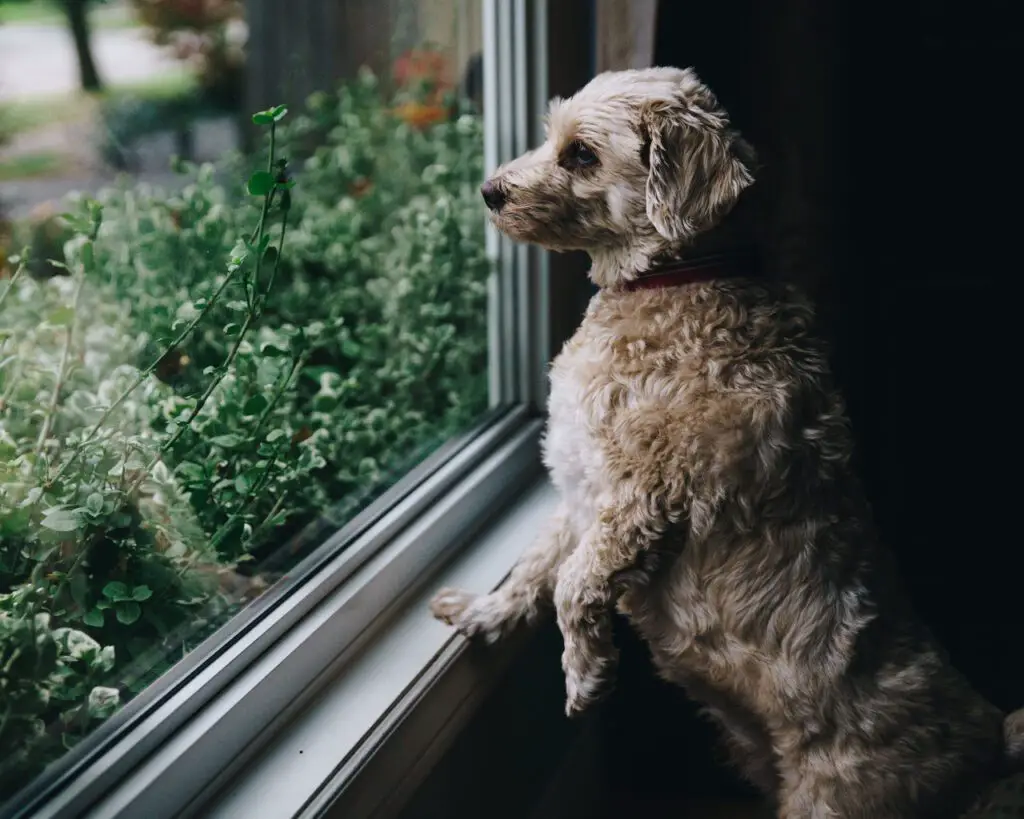Dogs, with their energetic personalities and strong instincts, can sometimes surprise us with their capabilities.
One such concern that arises is whether a dog can break through a window. This might seem like an unlikely scenario, but there have been instances where dogs have managed to do so due to intense emotions or a need to protect their territory.
In this discussion, we’ll delve into the factors that could lead a dog to break through a window, the risks associated with such incidents, and the preventive measures pet owners can adopt to ensure the safety and well-being of their furry friends and property.
Can a Dog Break Through a Window?

Yes, a dog can break through a window. Dogs are strong and determined animals that are capable of breaking glass with their teeth or pawing at it until it shatters.
This is especially true in cases where the windows are old and weak, have poor locks, or have been left open for some time.
In addition to this risk, leaving a window open even just an inch can be enough to tempt a curious pup who may be looking for an escape route outside.
Therefore, if you own a dog, one of the best things you can do to protect your home from potential damage is to ensure all windows and doors are properly locked when not in use.
Installing high-quality locks on windows and reinforcing panes of glass with additional security features can also help to prevent your pet from breaking through and potentially injuring themselves.
Will a Dog Jump Through a Glass Window?

Yes. In occurrences that are driven by intense emotions like fear, anxiety, excitement, or a strong instinct to protect their territory.
However, it is important to note that these incidents are relatively rare and not typical behavior for most dogs.
A dog might not fully understand the barrier presented by the glass window and may attempt to jump through it to reach a perceived threat or something that has captured their interest.
This can happen when the dog is left alone for extended periods or is experiencing high levels of stress.
How Do I Protect My Dog From My Windows?
Here is how to protect your dog from windows:
Provide Proper Training and Socialization
Training your dog to respond to commands and remain calm in various situations is crucial. Proper socialization from an early age can also help them become more comfortable with different environments and stimuli, reducing the likelihood of impulsive behavior around windows.
Create a Secure Environment
Ensure that your home environment is secure and dog-friendly. Keep windows closed or install window screens or guards to prevent your dog from accidentally jumping or falling out. This will also protect them from potential hazards outside.
Address Separation Anxiety
If your dog suffers from separation anxiety, work on addressing this issue through training, medication (if prescribed by a veterinarian), or seeking the help of a professional dog behaviorist. A dog with reduced anxiety is less likely to exhibit destructive behaviors around windows.
Distract and Redirect
Provide your dog with plenty of mental and physical stimulation, such as toys and puzzles, to keep them occupied and engaged. This will help reduce the chances of them becoming fixated on windows and attempting to jump through them.
Supervise Your Dog
Keep an eye on your dog when they’re near windows, especially if they’ve shown interest in jumping or breaking through them in the past. By supervising your pet, you can intervene and redirect their attention if necessary.
Use Window Film or Decals
Applying window film or decals to your windows can make the glass more visible to your dog, helping them recognize and avoid the barrier. This can be particularly helpful for dogs who may not realize there’s a solid surface between them and the outdoors.
Can I Leave Window Open For Dog?
No. While some owners may leave a window slightly cracked for ventilation or bark suppression, this isn’t recommended as it can lead to safety issues such as falls, injuries from glass breakage, or even theft of the animal.
Additionally, depending on where you live and what type of window you have (e.g., single-hung vs double-hung), an open window could create an entry point for pests, critters, and other potential sources of harm.
If fresh air circulation and comfort are desired during hot or humid months of the year, consider using a fan instead or investing in pet doors that allow animals to come and go safely and securely from your home.
Additionally, if the dog must stay indoors for extended periods of time with no access to the outdoors, you may want to look into purchasing an air purifier which can help improve air quality and reduce pet odors caused by indoor animals.
Overall, leaving windows open when a pet is left unattended is generally not recommended or safe. With good planning and proper safety measures in place, pets can still enjoy the fresh air and outdoor activities while staying safe and sound indoors.
Can a Dog Break Tempered Glass?
No. Tempered glass is designed to be much stronger than regular glass and it is very difficult for even the strongest dogs to break it.
To put it in perspective, if a person were to hit a pane of tempered glass with a hammer, it would probably not even crack.
It could, however, break into small pieces if subjected to an extreme amount of force such as being struck by a car or dropped from great heights.
Therefore, unless your dog has access to automobiles or high buildings, there should be no risk of them breaking the tempered glass around your home.
Are Dogs Afraid of Glass?
No. Dogs do not have a fear of glass. Some breeds that are more sensitive to their environment may exhibit signs of caution or apprehension when around unfamiliar objects, such as glass walls or sliding doors.
However, this is usually just a response to something new rather than actual fear.
To keep your dog safe around glass surfaces, make sure that the panes are secure and won’t shatter easily in the event of an accident.
Also, ensure that any furniture near the windows is securely placed so that your pet won’t accidentally knock it over while exploring its surroundings.
What If a Dog Steps on Glass?
If a dog steps on glass, it can result in cuts, punctures, or injuries to their paw pads. Immediate attention and care are necessary to prevent infection, and further damage, and alleviate pain.
Here’s what you should do if your dog steps on glass:
- Stay calm and approach your dog gently: Your dog may be frightened or in pain, so it’s essential to remain calm and reassure them. Approach your dog slowly and speak in a soothing voice.
- Examine the affected paw: Carefully inspect the injured paw to determine the severity of the injury and to locate the glass shard(s). If the glass is visible and easy to remove, you can proceed to the next step. If the injury appears severe or the glass is deeply embedded, contact your veterinarian immediately.
- Remove the glass: Use a pair of sterilized tweezers to carefully remove the glass from your dog’s paw. Be gentle and ensure that you don’t accidentally break the glass or push it further into the wound.
- Clean the wound: After removing the glass, clean the affected area with warm water and mild soap. Avoid using alcohol or hydrogen peroxide, as these can cause further irritation. Gently pat the area dry with a clean towel.
- Apply an antiseptic ointment: Consult your veterinarian for a suitable antiseptic ointment for your dog. Apply the ointment as directed to prevent infection.
- Bandage the paw (if necessary): If the wound is bleeding or open, you may need to bandage the paw to keep it clean and protected. Use a non-stick gauze pad to cover the wound, followed by a layer of self-adhesive bandage. Ensure the bandage is secure but not too tight, as this can restrict blood flow and cause discomfort.
In Conclusion
While it is relatively rare for a dog to break through a window, it is not impossible.
Factors such as strong emotions, protectiveness, and even accidents can lead to such incidents, posing risks to the dog’s safety and causing potential property damage.
To prevent these occurrences, pet owners should take proactive measures, such as providing proper training, ensuring a secure environment, and addressing any behavioral issues.
By doing so, we can create a harmonious living space that prioritizes the well-being of both our canine companions and ourselves.





Leave a Reply